By Prof. Dr. Aleksandër Meksi
Memorie.al / The events of recent years and the numerous historical publications, both by local and foreign authors, have shed new light on our history, especially that of the first half of the 20th century. Although of different natures, these publications hold value due to the complexity of our history, which until recently was distorted. Of particular value is the research in foreign archives and the publication of this documentation, as well as the publication of the memoirs and writings of the protagonists of the history of those years.
Viewed from the different perspectives that publications offer and due to the current nature of the problem, it is interesting to examine the history of the determination of the borders of the first Albanian state, from the declaration of Independence on November 28, 1912, until the Paris Peace Conference in 1919 and later, to the final resolution. The facts can be gleaned from the chronicles of the time, the reports of the chancelleries of the Great Powers, and from history books, especially those by Western authors.
But a complete history, a precise chronicle of the ordeal of border determination, is also the volume “Memoirs,” (1913-1933), by Mehdi Frashëri, one of the most prominent figures of Albanian politics of the time, from Independence until the communists came to power. As such, he was a participant and protagonist in many events in our history, and it would be in the interest of Albanian historiography, the history of the state, and diplomacy, to undertake research to fully find his memoirs and notes, so that the publication of the memoirs would be complete, given that he was meticulous in keeping them.
The preservation and publication of these “Memoirs” is a merit of Mehdi Frashëri’s nephew, Tefik Çelo, who kept and hid them during the dictatorship, which at the time constituted a “serious crime” that could be paid for with one’s life; it was a real act of courage and bravery.
The nature of the memoirs and the facts they contain make them unique and highly interesting not only for specialists but also for the ordinary reader who enjoys reading history. In them, we find not only personal impressions and facts but also analyses of that highly conflictual time, of extraordinary importance for the fate of the Albanian nation. It was the period when the first Albanian state was taking shape, which, although shrunken, saved the nation from disintegration and assimilation. This is precisely the action of extraordinary importance for Albanians and Albanian identity that the distinguished politician and diplomat had understood. Let an Albanian state be formed once and for all, for the future was uncertain.
Mehdi Frashëri (1874 Frashër-1963 Rome), unlike many politicians of the time who had a feudal and backward mentality, thanks to his origin, family, education, and experience in the Turkish administration (in 1912, he was the governor of Palestine), was oriented correctly in his diplomatic and political activities. His only language in extremely difficult discussions and agreements was argument and calm reasoning, without spiteful passions. He sought out and befriended even the most sworn anti-Albanians, because he knew how to convince them with the power of logic.
Therefore, it was no coincidence that he was chosen for the highest posts in the country’s state pyramid (including Prime Minister in 1935), and he was tasked with solving the most complex problems in all areas of the new state. He was a complete statesman, a rarity in these eight decades of the Albanian state’s existence. These partial memoirs are a testament to this, from which you not only get accurate information but also have something to learn about the art of leadership.
The largest part of the “Memoirs” is focused on the implementation of the decisions of the London Conference of 1913, in determining the places where the border line would pass, which Mehdi Frashëri dealt with as Minister of Internal Affairs (1918), Albania’s delegate to the Paris Peace Conference (1919), and later as Minister of Foreign Affairs, and when he represented Albania in the League of Nations (1923-1939). As High Commissioner in the International Commission for the determination of the Albanian borders, Mehdi Frashëri contributed more than the four Albanian delegations (the government of Durrës, Esat Pasha, Istanbul, and Romania) that went to the Paris Conference.
He managed to convince many opponents to preserve the borders set at the London Conference of 1913, opposing that of London (1915), when the infamous secret treaty was drafted between France, Russia, Italy, and England, which divided Albania among its neighbors, leaving only the central part under the rule of Esat Pashë Toptani. Italy would take Vlora and Sazan, while the other territories would go to Greece (the South) and Serbia (the North).
Better than many other patriots, Mehdi Frashëri had followed with attention the policy of the European Great Powers towards the Balkans, which was considered a land of contradictions where everything happens in a way it shouldn’t. Nevertheless, each country had its supporters and tutors, while Albania had to stand up for itself. It had been turned into a valuable bargaining chip in the dealings of the Great Powers.
In fact, the British Foreign Minister, Edward Grey, had openly admitted this when he gave explanations in the House of Commons on the issue of determining Albania’s borders: “I am convinced that, when everything is known, this action will be rightly criticized from many sides, by every person who knows the country and looks at the issue only from the viewpoint of its population.
But we must bear in mind that, in the talks about Albania’s borders, the main goal was to not open a conflict between the Great Powers. Therefore, if the agreement on Albania was reached by maintaining harmony between the Great Powers, we can say that it was a complete success for the vital interest of peace in Europe.” This does not seem to be so true if we consider the peace in the Balkans and in the homes of Albanians under a foreign yoke.
With these disadvantages, the Albanian delegations went to the Paris Conference, where many options were laid out at the negotiation tables of the commissions and sub-commissions, but none in favor of Albania. On May 30, 1919, the Treaty of Peace was signed in Paris, where Albania was declared an independent state, whose borders would be determined later. This was a very difficult paragraph of the treaty to implement.
It was not implemented, because the Albanian territories were considered by the neighbors (Serbs, Greeks, Montenegrins, Bulgarians) as the destination of their expansionist aims; it was not implemented because there were quarrels between the Great Powers, as each aimed for zones of influence. As the well-known scholar and historian, Prof. Dr. Romeo Gurakuqi, whose study we know from his short description, informs us, the process begins in November 1918, when the international administration is re-established in Shkodra, and ends on November 9, 1921, when the final decision on the status and borders of the first Albanian state is made.
We must mention here two major historical events, not yet properly evaluated in this aspect, which accelerated the implementation of the decisions of the Paris Conference: the Congress of Lushnja and the Vlora War. The Congress of Lushnja was convened on January 21, 1920, under the chairmanship of Aqif Pashë Elbasani.
The Congress announced the creation of the new Albanian state, under the leadership of a High Council of Regency, and declared the government of Durrës overthrown and did not accept any form of foreign mandate or protectorate. In the telegram sent to the Great Powers and the Paris Peace Conference, it was stated that; “the Albanian people would fight to the last drop of blood against any decision that would endanger the territorial integrity of the homeland and its independence.”
Until then (1919-1920), the Albanian issue was not discussed separately, but as a side aspect of the problems that the interlocutors dealt with. The change happened with the well-known stance of the American President, Wilson, for the right of peoples to self-determination and the note of the American government of March 6, 1920, according to which, it was requested that the Albanian issue should not be the subject of talks between Italy and Yugoslavia, and even more so that the President had opposed that Albanian lands in the south and north of the country be used for compensation for others.
As the historian Romeo Gurakuqi rightly notes, the intervention of the American government was a blow to the secret Treaty of London (1915). We should also not deny the contribution of the Albanians of America for such a stance and also the acceptance of our country into the League of Nations (December 1920), which finally recognized it as an independent country.
The government that emerged from the Congress of Lushnja on February 11 was established in Tirana, which was designated the capital of Albania. The echo of the Congress was great and immediate in the West, so opinions at the Paris Peace Conference began to change. Thus, on March 11, 1920 – the forces of the Great Powers leave Shkodra and hand over the city to the authorities of the Albanian government.
So, the Congress of Lushnja and the Vlora War saved the country from annihilation. Of course, what happened later needs explanations that are neither the place nor the case to analyze. However, the odyssey of the on-the-ground determination of Albania’s borders would continue for a long time.
In 1923, as we emphasized above, Mehdi Frashëri was appointed high commissioner to the International Commission for the determination of the Albanian borders. Thanks to the extraordinary diplomatic skills of Mehdi Frashëri, this great statesman and politician, this excellent jurist and negotiator, with a historical contribution in the protection of every inch of the borders, we have Albania today; otherwise it might not have been this much. And the dictatorship declared the great patriot, a direct descendant of the Frashëri family, an “enemy.”
It was no coincidence that in May 1919, the American President at the Paris Peace Conference, when the victors had rushed upon the vanquished, proclaimed the great idea of the self-determination of peoples, an idea that few understood then, but which became the basic orientation of American foreign policy. Almost a century has passed since that time and it is still not becoming a reality for the Albanian nation.
The itinerary of the determination of the borders of the first Albanian state, which was drafted in the chancelleries of the Great Powers where the decisive contribution was American, is determined by these main milestones:
- October 1913, the International Commission for the determination of the borders comes to Albania. Mehdi Frashëri was the head of the Albanian representation to this commission. (The activity of this commission is detailed in the “Memoirs”).
- April 26, 1915 – The Secret Treaty of London drastically fragmented Albania.
- May 30, 1919 – The borders of Albania are set at the Paris Conference.
- 1921 the agreement for the determination of the current borders is concluded, which also required several years of work on the ground.
Years later, Richard Holbrooke, the negotiator of the Dayton Agreement and the Rambouillet Conference, in the preface of the work “Paris, 1919” by the Canadian historian, Margaret MacMillan, writes among other things that; at the Paris conference, the Big Four had aimed to bring order, not only in Europe, but throughout the world, but in truth, only 20 years later, it was proven that it had covered crisis with crisis. One of these “crises” was the arbitrary creation of Yugoslavia, the biggest source of conflicts in today’s Europe.
By making this temporal excursion into the determination of Albania’s borders, through the reading of the work “Memoirs (1913-1933)”, we aimed to understand the great historical importance for our nation, of the recent events and developments for the Independence of Kosovo. It is precisely the triumph of American policy for the freedom and independence of peoples, that made possible the announcement in Vienna of the “Ahtisaari” package, which led Kosovo towards Independence.
I want to point out that more than a century has now passed since that day when Albania, as Mustafa Kruja wrote with his own hand in the Act of the Vlora Assembly, on November 28, 1912, “…becomes its own, free, independent.” In fact, the state that was recognized for the Albanians by the Great Powers and others did not include all the lands inhabited by Albanians – Albania. As if by a coincidence, it was the Americans (under the NATO flag) who liberated the Albanians of Kosovo from the yoke and violence of Serbia, which reached its peak and the dimensions of genocide under Milošević’s madness.
For several years now, the second Albanian state has been created, again in a part of the Albanian lands and on the border with the first Albanian state, and not only with it. It was a solution that we must now accept and rejoice in, not without noting that the friends and well-wishers of the Albanians are trying to annoy the friends of others as little as possible, and to hurt those who are losing their unjust power over the Albanians as little as possible, thus contributing to the stability of the region. We can only hope for the inclusion of all of us in the European Union and that then we will have understood that community and not feudal division brings progress. / Memorie.al




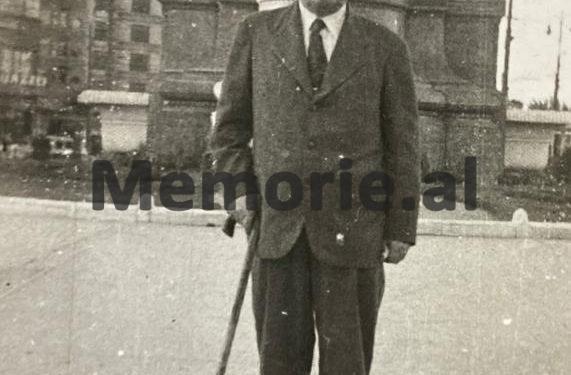
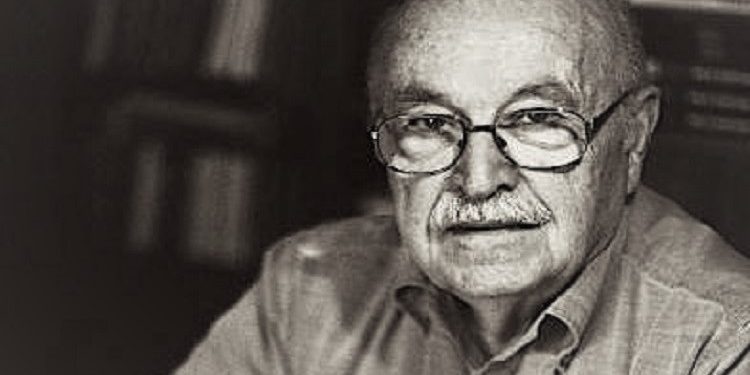
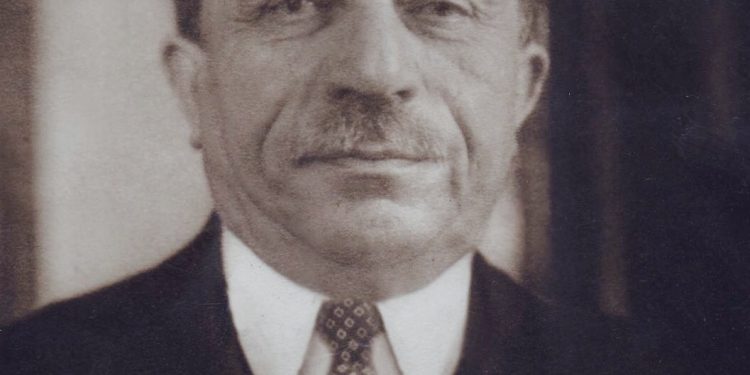

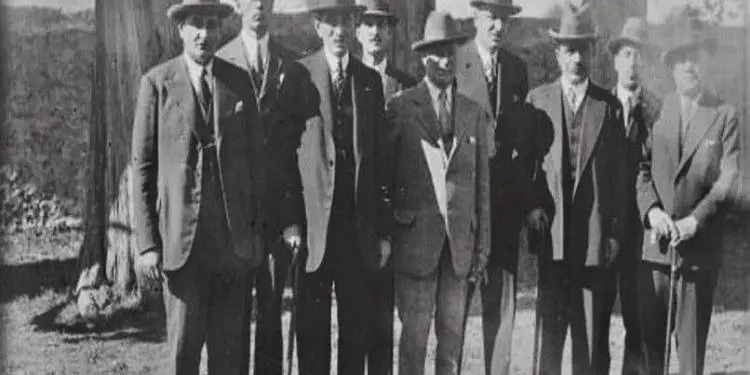
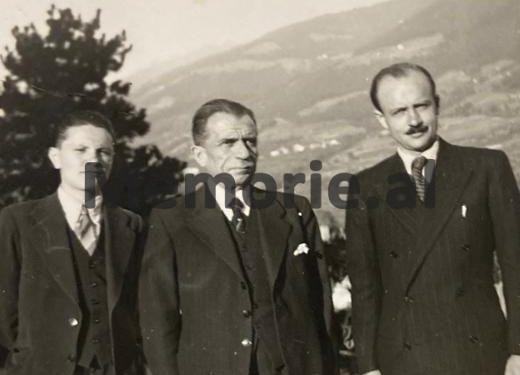



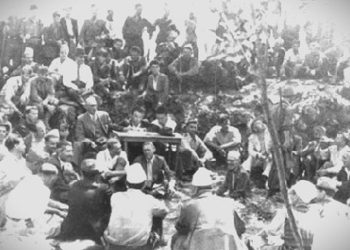
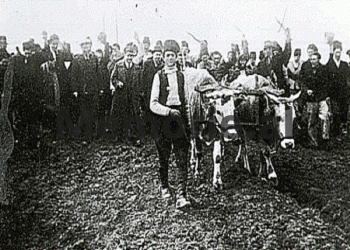
![“They have given her [the permission], but if possible, they should revoke it, as I believe it shouldn’t have been granted. I don’t know what she’s up to now…” / Enver Hoxha’s letter uncovered regarding a martyr’s mother seeking to visit Turkey.](https://memorie.al/wp-content/uploads/2026/01/Dok-1-350x250.jpg)
